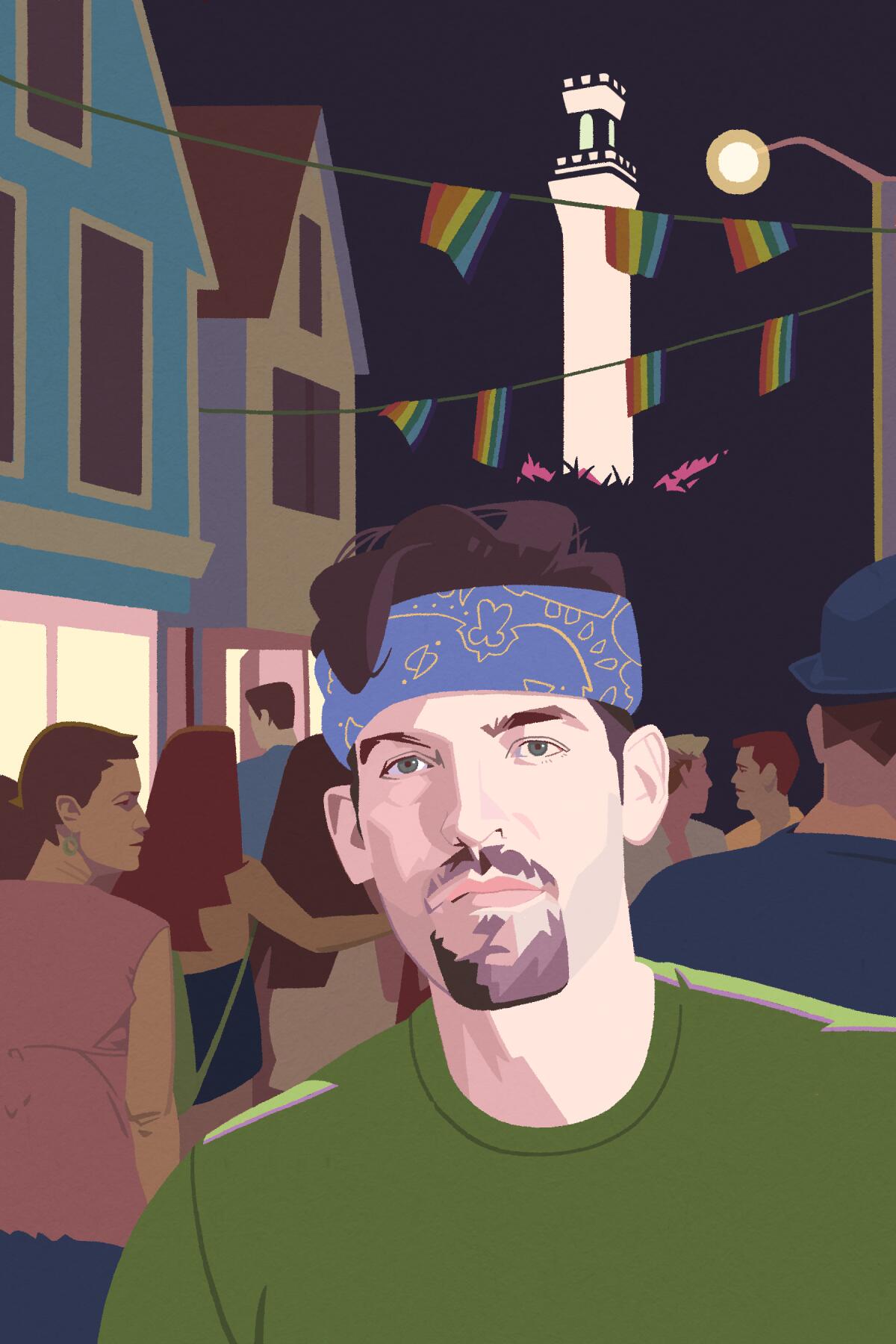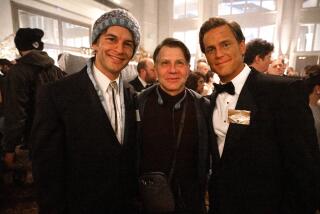Review: Such was life in Provincetown

If I were to write a memoir of my own queer growing-up in the 1990s, the kind that Paul Lisicky has done with “Later: My Life at the Edge of the World,” it might include a scene from the trip I took to Provincetown, Mass., where I even met Paul briefly. I remember not understanding what people liked about the town until I got out to the dunes and the water’s edge — the edge the subtitle refers to — and found myself on a trail along the tops of the dunes, where the views were spectacular — of the water and the landscape, and also the men, laying out on blankets wearing Speedos, or naked, some indicating they were open to sex or at least getting off on being seen. It’s not that Provincetown has secrets exactly, but angles, from which some things are seen, others not, and there are people who live there because of this — because they need or love that mix of secrets and openness. Or they profit from it.
In an essay collection and two subsequent memoirs, Lisicky, also an award-winning fiction writer, has frequently charted the meanings of his life in public, first in the essay collection “Famous Builder” and then the memoir, “The Narrow Door.” Provincetown was always a setting in those books but never a subject the way it is now, in “Later.” The young Lisicky we meet at the beginning has been awarded a prestigious Fine Arts Work Center fellowship, and is anxious to leave behind the good-boy act of his childhood and the charismatic mother who was the main audience for it. He leaps into the deep end of being a gay man in Provincetown in the early 1990s, during what we would come to call the height of the AIDS epidemic, as if it were a wave that crested instead of going on to flood the world.
A scene from an essay in “Famous Builder” contains a premonition of this book. “I’ve been in town but two weeks, since October 1st, and already it seems that half the populace has participated in my makeover,” Lisicky writes, painting himself as a Provincetown Cinderella, the woodland creatures of the town draping him in Tom of Finland tees. “I couldn’t be more grateful for my new friends,” he continues. “They must get that I’m hungry to slough off my old skins, that I’ve had enough of being a good boy, so desperate to please. They must know that I need to be a little bad before it’s too late.”
The makeover in “Later,” is described differently. As he exiles the J. Crew clothes he once favored — “Who was I trying to please?” — Lisicky understands himself to be casting off a disguise, “the ubiquitous costuming of my 20s, the look of inclusion and aspiration, but also the look that once allowed me to disappear.” He gets a haircut favored at the time, cropped close on the sides, long on top, and a goatee. A friend tears the sleeves off his polo shirt and describes it fit for Provincetown. “I expect clothes to do all the work of identity, as does practically everybody.”
His Doc Martens are too small, “and occasionally a terrible clear bubble on my heel leaks and burns, keeping my sock disconcertingly wet.” His new look , “an olive T-shirt, skinny white jeans, a blue bandanna on my head,” doesn’t sound so different from, well, J. Crew. But he feels different. “It’s surprising how quickly I take to this new appearance, as if my body had always been waiting for it.”
Out on the street, the makeover and the place preside over another transformation:
“I stand up straighter, my shoulders fall backward as if they’ve been held up for too long by pulleys and strings. My walk changes too, or so I imagine: my heels strike the pavement as if I’m possibly damaging my feet. This is what power feels like, but only when power is spread evenly, or when queerness isn’t othered but is central. I look at people’s faces; people look back at me, not exactly with need but curiosity. Who are you?”
This transformation and the lifelong journey it became is his other subject. In “Later” Lisicky takes, at last, the measure of that good boy he once was, and may still be, so desperate to please. And in doing so, he learns just what it might mean to be a little bit bad, and as a result, quite possibly human, entirely human, for the first time.
— — —
Town, as Lisicky calls Provincetown, and being queer, and the 10% of the town that died in the years he was there — this made him over also. But the urge to be a good boy at first became the urge to be a good gay, a good safe-sex practitioner, a good friend, a good boyfriend.
The chapters are full of named sections, lists of what makes up his life in Provincetown: Haven, Movie, Pilgrim, Foglifter, Wally, Imposter Syndrome. This pointillistic style allows Lisicky to build his story impressionistically. There are no surprises in the general plot, per se: Lisicky becomes the published writer and openly gay man we’ve come to know. But the “how” of it fascinates. As a young man, the questions are many and often about sex: Is he the boyfriend type? Does he like casual sex? What kind of sex does he like? Also central are the ups and downs of his creative endeavors and the conflicts inherent in a town that is both religiously conservative, thanks to Portuguese immigrants, and an internationally known LGBTQ resort.
He especially captures the fear I’d almost forgotten — the intensity with which we as gay men so often feared one another. It was particularly fascinating to find out, near the end, the prism of this long look through the ’90s. He is looking back from 2018, when he begins taking PrEP, the AIDS prophylaxis, and having what we then called “unprotected sex.”
Unprotected sex now means sex without health insurance, he notes, contemplating a semester’s work with another university: He must verify that their provider will pay for his PrEP. Living now in the presence of sex without fear, his past and present look different to him. “How many times did HIV fear masquerade as other fears?” When Lisicky describes watching a young man having sex with four other men at once, his lack of fear — not fearlessness — is almost erotic to him.
“There’s no fear in his face, no resistance,” he writes. “No hand raised to say pull out when one man’s face tightens in ecstasy. No fear about being interpreted as a slut, none of those worn-out cares about self-destruction. He’s simply a young man who hasn’t had to take the costs of a plague into his blood. He isn’t rebelling. ... He’s not hiding. Not envisioning a premature death, not contending with the deaths of 10 friends, 25 friends, keep going. I’m in awe. When he gets home he’ll toss some green vegetables into a clear glass bowl.” Here at last, the queer life freed from the religious condemnation and the fear of death he always thought he’d find in Provincetown.
Having begun by asking “Who Am I,” Lisicky closes by asking who he could have been. “What could I have made out of the fear I held back,” he says — a statement more than a question, as if gesturing toward all of it. “By which I mean: How many brain cells were burned up, extinguished?” It’s a powerful question many of us feel, as survivors of this time and the times after. What could our lives have been like if we hadn’t been made the target of the Republican right wing? What art, what pleasure, what happiness, could have been ours? The bitter bargain living as a queer person in America has been for so long.
This memoir is much like his Provincetown, exulting in tenderness and lust, lit with flashes of poignant spectacle, even the majestic — the way a drag queen at night can become, in sequins under a spotlight, full of the fire and beauty we associate with goddesses, before descending back to the realm of the human. “When people in their twenties swallow this pill,” he writes of PrEP, “they take a different story into their body.” The one they’d never know otherwise is here.
Chee is the author of the novel “The Queen of the Night” and the essay collection “How to Write an Autobiographical Novel.”
Paul Lisicky
Graywolf: 240 pages, $16
More to Read
Sign up for our Book Club newsletter
Get the latest news, events and more from the Los Angeles Times Book Club, and help us get L.A. reading and talking.
You may occasionally receive promotional content from the Los Angeles Times.








